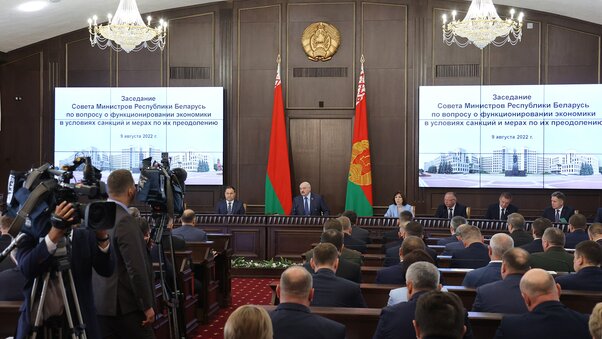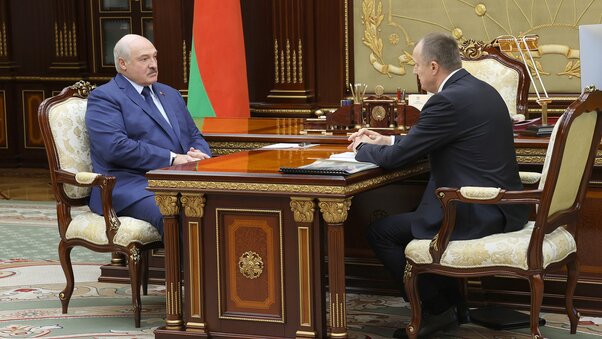Meeting with Deputy Prime Minister Piotr Parkhomchik
- 5
- 5:49
Belarusian President Aleksandr Lukashenko met with the newly appointed Deputy Prime Minister Piotr Parkhomchik.
Aleksandr Lukashenko noted that Piotr Parkhomchik has a wealth of experience of working in industry, including in senior positions of such large enterprises as Minsk Tractor Plant and BelAZ. However, the new deputy prime minister is yet to delve into other areas of work, and Yuri Nazarov, who moved from the post of deputy prime minister to the post of head of the Belarus President Property Directorate should provide him all-round assistance. "You are intimately familiar with industry. The energy complex, petrochemical, woodworking, forestry are new areas of work for you as a deputy prime minister," the head of state said.
According to him, Yuri Nazarov in his new position will keep an eye on forestry and woodworking: "If necessary, he will provide the necessary help and assistance. He will keep tabs on forestry, woodworking. There is also Gomel Oblast. This is something he and Ivan Krupko promised me. They will do everything to ensure that Gomel Oblast reaches the level of at least Brest Oblast," the head of state said.
Addressing the new deputy prime minister, Aleksandr Lukashenko outlined a number of tasks in various areas: from industry and agriculture to specific projects.
"In the economy our task is not to fall below last year. Industry should play the main role here,” the head of state emphasized. “Agriculture looks set to grow by 4% as projected. There is everything for this. The weather has been good. We are set to harvest 8 million tonnes of cereals (we are almost on the home stretch). Probably, this will be 8.2 million tonnes. That's going to be great. Plus rapeseed, plus corn. If everything works out we will have 11 million tonnes, a record high for our country. This will be enough to feed people and to make compound feeds for the animal husbandry.”
It is important we tap into new markets and preserve the traditional ones, the President said. Distant countries such as, for example, Zimbabwe, are promising markets too, the Belarusian leader believes. "This is a unique country," he said. “You will be able to work in such countries. They also have enough problems. Zimbabwe, for example, has been dealing with sanctions for a long time. Probably, its gold, diamonds have been of interest to some Western leaders."
"I have already said that there is no need to discard any markets," the Belarusian leader continued. “If we are able to work in the west, we will work in the west, in the south, north, east... wherever our products are needed. Do we have a gigantic economy, like Russia? No, we don't. Our economy is compact. What we produce is needed everywhere: both food products and mineral fertilizers, especially today. We need to do this to prevent hunger. The West will buy these fertilizers. It is close to us. There is no need to give up on these markets,” the President said.
The President added that the number one issue for the Council of Ministers is import substitution: “We are talking a lot about it, and we have started to do something. Recent troubles, these sanctions have forced us to deal with import substitution.”
Aleksandr Lukashenko stressed that Piotr Parkhomchik would continue overseeing the implementation of major investment projects he had been responsible for before. In particular, these are the investment projects at the oil refineries in Mozyr and Novopolotsk, as well as the launch of the Belarusian nuclear power plant at its full capacity. “Piotr Aleksandrovich, we have to get serious about these issues and finish them all. We need to deal with this red tape, sort everything out in principle. The BelNPP must operate at full capacity. You need to deal with these issues,” the President said.
The production of MAZ buses was also discussed at the meeting. “It is a very promising sector. You see that we fail to meet the demand. Everything necessary should be done for MAZ. You need to help, do everything possible to develop bus production,” the head of state instructed.
He recalled his recent trip to Miory and his visit to the rolling plant: “It is a good enterprise that can work. We know what needs to be done there. We need to make the best use of it.”
Aleksandr Lukashenko also touched upon the tanning industry: “We talked a lot about rawhides. I am planning to visit the company in the near future. Take a look at the management of the enterprise, at all those who manage this sector. It is a very important production today. The market is huge. We need to apply additional efforts here. This is not the same as making BelAZ trucks and selling them. The rawhide must be refined and sold with a high added value. All necessary decisions have been made there. We need to revisit the company and see how they are implemented."
The President said that among the important areas of work for the deputy prime minister is the implementation of projects at Grodno Azot and Svetlogorsk Pulp and Board Mill. As far as the latter is concerned, it is necessary to organize advanced processing there, Aleksandr Lukashenko stressed. “We need to make it perfect in order to sell the finished product, not semi-finished goods, and provide ourselves with cardboard and other products as well,” he said.
“We should invest in what we can produce. Once we came to this conclusion in woodworking. If we have good automotive engineering, heavy vehicles and other vehicles, let us work further here, there is a lot of work to be done in these sectors, primarily is what concerns import substitution. It is the same here. If we produce pulp or something else from wood, let us turn it into paper, then paper into cardboard and packaging. Why do we export semi-finished products, and then import cardboard to pack women's pantyhose or perfume? We have to do all this at home. We need to work deeper in the areas that are effective today and which products are in demand in the markets,” the head of state said.


